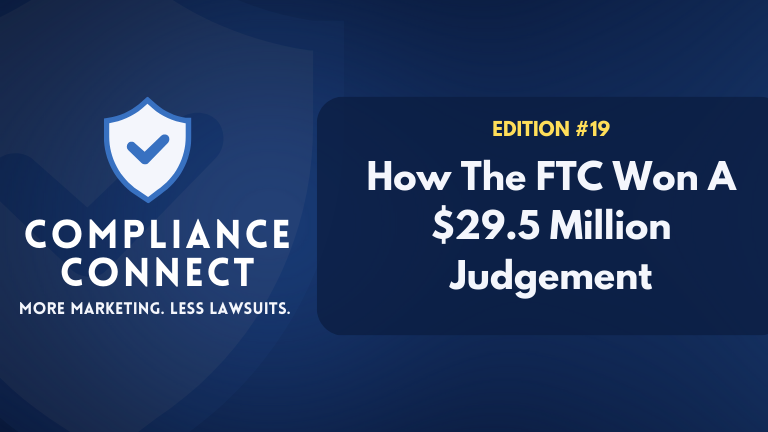Good morning! This is the nineteenth edition of the Compliance Connect newsletter.
The goal is simple: to keep you in the loop on what the FTC and other regulatory agencies are up to so that you can protect yourself.
These newsletters will land in your inbox twice a week – Mondays and Thursdays.
Remember: this is NOT legal advice, only information!
Here’s the rundown today…
- 🔒 State Privacy Law Roundup
- 🔍 Clue Reveals FTC Priorities?
- 💰 How The FTC Won A $29.5 Million Judgement
- 📞 Who Does The Telemarketing Sales Rule Apply To?
- 🏛️ Another FTC?
Compliance Digest: What You Should Read Today
What’s Going On With State Privacy Laws?
It’s important to be aware of state privacy laws and to make sure that your business is compliant with them.
For example, if you sell to California residents, then you need to be aware of the California Consumer Privacy Act or you might face some steep penalties.
This website has a helpful map that shows which states have passed privacy laws, along with links to the laws themselves.
This is an active regulatory space.
When the legislative season wrapped up over the summer, Maryland and Minnesota enacted new privacy laws. Vermont and New York are nearing decisions. Pennsylvania and Massachusetts continue to advance privacy bills, and Hawaii’s attempt has stalled for now.
What The FTC Is Prioritizing (Notices Of Penalty Offenses)
Since the AMG Capital Supreme Court case in 2021, the FTC was forced to use new tools to obtain monetary relief for customers.
The first tool is using Section 19 authority, which they use primarily for telesales.
The other tool they use is to send companies “Notices of Penalty Offenses,” which allows them to seek civil penalties if a company is aware that the FTC has issued a written decision against another company that the conduct was unfair or deceptive.
The idea is that if you’re aware that the conduct is illegal, and you do it any way, you can be sued.
You’ll see a list of recent notices the FTC has put out when you click the link. Read through these to see which ones your business might be vulnerable to.

Case Breakdown: Google Treasure Chest
I want to talk about an important case since it highlights two areas that the FTC focuses on…
- Business opportunities
- Recurring offers
In 2009, the FTC started investigating a company called Google Treasure Chest (also known by a lot of other names). Their parent company was Infusion Media, Inc.
This was a subscription service that promised customers easy ways to make money online.
Their ads featured giant checks and luxurious lifestyles and were swimming with testimonials.
What They Were Accused Of
These offers were doing several things wrong.
First, the company’s entry-level product was a recurring offer in the business opportunity space.
That meant they started in an already highly regulated industry!
Second, Infusion failed to clearly disclose the price of the monthly subscription and the terms for canceling the subscription
Third, the company used blatantly deceptive practices.
For example, Infusion used random online images of individuals and claimed that they were clients, then displayed fake checks and fake results.
Fourth, they “trapped” people by “luring” them into free or very cheap offers, without properly disclosing the buffet of subscriptions in the backend.
The case focused on the many subscription services a customer would automatically get subscribed to, all for varying costs.
The customer had no idea how many, which ones, or even how to get out of them.
Aftermath
This case drew the attention not only of the FTC, but also VISA, Mastercard, and AMEX, all wanting to heavily regulate continuity programs.
The eventual settlement was for $29.5 million.
Partly as a response to this, in 2010, Congress passed ROSCA to better regulate the rules around subscriptions.
ROSCA covers continuity plans, automatic renewals, free-to-pay conversion sales, and negative options.
As you can see, this was a MAJOR case in the FTC’s history!
Click here to read the full complaint
Did You Know…
With some important exceptions, any businesses or individuals that take part in “telemarketing” must comply with the Telemarketing Sales Rule.
The rule does NOT apply to charities (although it DOES apply to for-profit companies calling on behalf of charities).

Quick Compliance Tip: Is The CFPB Another FTC?
Let’s talk about another regulator: the Consumer Financial Protection Bureau (CFPB).
For many readers of this newsletter, they are a real threat.
While the FTC is all about stopping deceptive and unfair trade practices, which is pretty broad, the CFPB focuses specifically on financial transparency and fairness.
This agency was created in 2011 as a result of the financial crisis. It’s goal is to make sure that financial products are transparent, fair, and competitive.
If you market anything related to…
- Real estate
- Cryptocurrency
- Insurance
- Banking
- Credit
- Trading stocks
…and more, the CFPB is watching.
Recently, the CFPB gained even more regulatory power after a Supreme Court ruling confirmed its funding structure is constitutional.
This means you’re likely to see the CFPB becoming MORE aggressive in how it enforces compliance.
Like the FTC, they can investigate your marketing practices, and if you’re found violating their guidelines, you could face serious penalties.
Even if you’re compliant with FTC rules, you need to make sure you’re also in line with the CFPB’s regulations. Overlooking this could put your business at risk of fines or legal action.
Bottom line: if you’re marketing anything with a FINANCIAL angle, you need to stay informed about what the CFPB is doing to avoid costly consequences!
